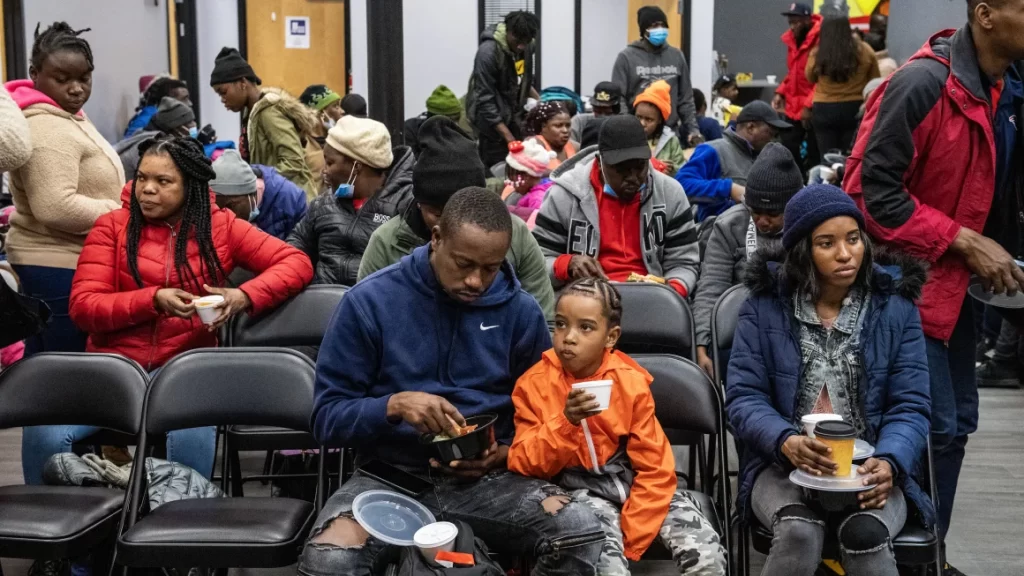Biden Administration Ends Temporary Legal Status for Migrants from Four Countries
3 min read
Migrants eat a meal at the La Colaborativa day shelter in Chelsea, Massachusetts, on February 22, 2024. Joseph Prezioso/AFP/Getty Images

Migrants eat a meal at the La Colaborativa day shelter in Chelsea, Massachusetts, on February 22, 2024. Joseph Prezioso/AFP/Getty Images
The Biden administration has announced that it will not extend temporary legal permissions for certain migrants from Nicaragua, Cuba, Venezuela, and Haiti, effectively requiring them to pursue other legal avenues to remain in the United States. This decision, revealed by the Department of Homeland Security (DHS), marks a significant shift in policy as the country approaches a crucial election cycle.
Initially, the administration launched a humanitarian program nearly two years ago, specifically designed for Venezuelans seeking to enter the U.S. The program permitted these migrants to live and work temporarily in the U.S. as a means to manage increasing border crossings. Participants were required to have a U.S.-based sponsor, undergo rigorous screening and vetting, and complete necessary vaccinations.
Following the initial rollout for Venezuelans, the program was extended to include Nicaraguans, Cubans, and Haitians. This extension aimed to facilitate orderly migration and provide a legal pathway for individuals from these nations. However, it soon became a contentious issue, with Republicans claiming that the administration was misusing its parole authority and criticizing President Joe Biden’s overall immigration strategy.
As of late August, data indicated that nearly 530,000 migrants from Cuba, Haiti, Nicaragua, and Venezuela had entered the U.S. under this program. Although new applicants from these countries can still apply, the administration briefly paused the program over the summer due to concerns regarding potential fraud.
DHS officials have consistently maintained that the program was intended to be temporary. Its purpose was to provide a limited opportunity for migrants to apply for other legal statuses while in the U.S. While the administration allowed for re-parole for Ukrainians and Afghans under similar humanitarian programs, it did not guarantee the same for the migrants from the four targeted countries.
The expiration of parole for certain Venezuelans is imminent, coinciding with heightened immigration discussions as Election Day approaches. Former President Donald Trump and Vice President Kamala Harris are both prioritizing immigration in their campaigns, making this a pivotal issue.
A spokesperson from DHS clarified the program’s intention, stating, “As noted in the Federal Register, a grant of parole was meant for a temporary period of up to two years. This time frame was designed to enable individuals to seek humanitarian relief or other immigration benefits while contributing to the U.S. economy.”
As these protections begin to lapse, some migrants may have already sought alternative legal options to stay in the U.S. Those who have not will be directed to apply for a different status, leave the U.S., or face potential deportation, placing many in a precarious legal situation.
For Venezuelans and Haitians, there is the option of applying for Temporary Protected Status (TPS), a form of humanitarian relief that some migrants have already pursued. Cubans benefit from a unique pathway to permanent residency. However, Nicaraguans face more significant challenges, as they do not have the same opportunities for relief. While asylum is an option for all nationalities, not every applicant qualifies.
In response to the administration’s announcement, House Homeland Security Committee Republicans expressed their discontent, arguing that while parole may not be renewed for some Venezuelans, there are other ways these individuals could secure legal residency.
This shift in policy has raised concerns among advocates and lawmakers about the implications for migrants who were relying on the temporary protections. As the Biden administration navigates this contentious political landscape, the complexities of immigration policy remain at the forefront of national discourse.